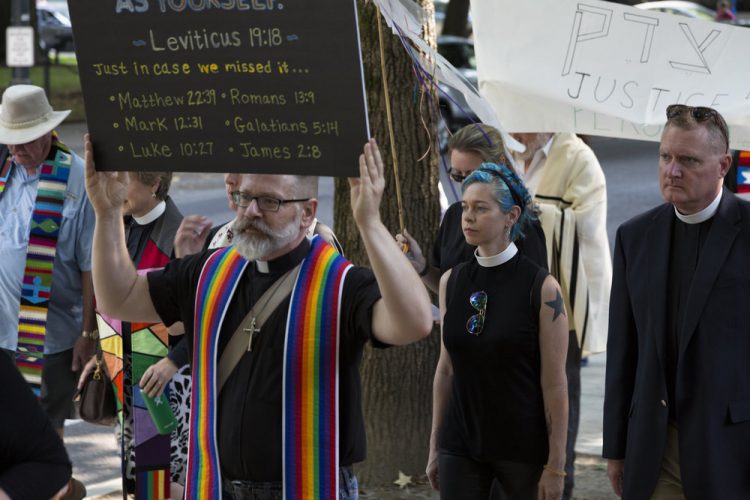Here’s what it feels like to be pro-social justice without actually risking anything:
Christians cannot pretend they can transcend politics and simply “preach the Gospel.” Those who avoid all political discussions and engagement are essentially casting a vote for the social status quo. American churches in the early 19th century that did not speak out against slavery because that was what we would now call “getting political” were actually supporting slavery by doing so. To not be political is to be political.
The Bible shows believers as holding important posts in pagan governments — think of Joseph and Daniel in the Old Testament. Christians should be involved politically as a way of loving our neighbors, whether they believe as we do or not. To work for better public schools or for a justice system not weighted against the poor or to end racial segregation requires political engagement. Christians have done these things in the past and should continue to do so.
Nevertheless, while believers can register under a party affiliation and be active in politics, they should not identify the Christian church or faith with a political party as the only Christian one. There are a number of reasons to insist on this.
One is that it gives those considering the Christian faith the strong impression that to be converted, they need not only to believe in Jesus but also to become members of the (fill in the blank) Party. It confirms what many skeptics want to believe about religion — that it is merely one more voting bloc aiming for power.
Another reason not to align the Christian faith with one party is that most political positions are not matters of biblical command but of practical wisdom. This does not mean that the church can never speak on social, economic and political realities, because the Bible often does. Racism is a sin, violating the second of the two great commandments of Jesus, to “love your neighbor.” The biblical commands to lift up the poor and to defend the rights of the oppressed are moral imperatives for believers. For individual Christians to speak out against egregious violations of these moral requirements is not optional.
However, there are many possible ways to help the poor. Should we shrink government and let private capital markets allocate resources, or should we expand the government and give the state more of the power to redistribute wealth? Or is the right path one of the many possibilities in between? The Bible does not give exact answers to these questions for every time, place and culture.
Christians should be involved in government, but most preachers telling you that won’t be involved. Why? It violates the spirituality of the church and confuses the two kingdoms, if church officers to serve in government or testify before legislative bodies.
Churches should encourage political engagement but they won’t take a side between the parties because that would be partisan. And which policies and legislation allow for bi-partisan moderation? If you want police or prison reform you are going to have to work with real politicians who belong to real political parties.
And Christians, including ministers, should speak to matters of injustice even though the Bible doesn’t address social or political realities. “Lift up the poor” and “defend the rights of the oppressed” but don’t ask me how to do it (or also ask why I’m stressing this right now when I wasn’t preaching about this twenty-five years ago).
“Christians cannot pretend.”
Keller’s editorial is part of a pose. He can present himself as one on the side of social justice without ever having to dirty his hands with support for a specific policy or legislator. At least the PCUSA actually passed resolutions in favor of the Eighteenth Amendment and Volstead Act. They didn’t do what J. Gresham Machen recommended, which was saying, “yes, drunkenness is a sin, but the church doesn’t have the biblical warrant for declaring federal or state policy.” Keller apparently agrees with Machen about that. He doesn’t agree with Machen’s reluctance to line up behind the crowd.
And speaking of policy, while many are sizing up (some in installments!!!) the MacArthur inspired statement on social justice, practically all the #woke evangelicals have forgotten about the Justice Declaration. That was a 2017 statement about prison reform, co-sponsored by Prison Fellowship and the SBC’s Ethics and Religious Liberty Commission. (By the way, the Justice Declaration attracted about 3,300 signatures, MacArthur’s about 9,500.)
If you want to pursue social justice, maybe you identify one issue, like prison reform, promote it, stick with it, and keep at it.
Or if you want to look like you are on the right side of social justice, you affirm it but leave the details to practically everyone else who already knows, thanks to the media, politicians, news networks, ESPN, that social justice is a problem.
What value have you added?


